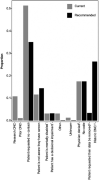Improving Precision of Do Not Contact Codes: Results of a Manual Review to Inform Coding and Case Contact Procedures
- PMID: 37260812
- PMCID: PMC10229187
Improving Precision of Do Not Contact Codes: Results of a Manual Review to Inform Coding and Case Contact Procedures
Abstract
Introduction: Central cancer registries are responsible for managing appropriate research contacts and record releases. Do not contact (DNC) flags are used by some registries to indicate patients who should not be contacted or included in research. Longitudinal changes in DNC coding practices and definitions may result in a lack of code standardization and inaccurately include or exclude individuals from research.
Purpose: We performed a comprehensive manual review of DNC cases in the Utah Cancer Registry to inform updates to standardization of DNC code definitions, and use of DNC codes for exclusion/inclusion in research.
Methods: We identified 858 cases with a current or prior DNC flag in the SEER Data Management System (SEER*DMS) or a research database, with cancers diagnosed from 1957-2021. We reviewed scanned images of correspondence with cases and physicians, incident forms, and comments in SEER*DMS and research databases. We evaluated whether there was evidence to support the current DNC code, a different DNC code, or insufficient evidence for any code.
Results: Of the 755 cases that had a current DNC flag and reason code in SEER*DMS, the distribution was as follows: 58%, Patient requested no contact; 20%, Physician denied; 13%, Patient is not aware they have cancer; 4%, Patient is mentally disabled [sic]; 4%, Other; and 1%, Unknown. In 5% of these cases, we found evidence supporting a different DNC reason code. Among cases included because of a prior DNC flag in SEER*DMS (n = 10) or a DNC flag in a research database (ie, cases with no current DNC flag or reason code in SEER*DMS, n = 93), we found evidence supporting the addition of a SEER*DMS DNC flag and reason code in 50% and 40% of cases, respectively. We identified DNC reason codes with outdated terminology (Patient is mentally disabled) and codes that may not accurately reflect patient research preferences (Physician denied without asking the patient). To address this, we identified new reason codes, retired old reason codes, and updated current reason code definitions and research handlings.
Conclusion: The time and resource investment in manual review allowed us to identify and, in most cases, resolve discordance in DNC flags and reason codes, adding reason codes when they were missing. This process was valuable because it informed recommended changes to DNC code definitions and research handlings that will ensure more appropriate inclusion and exclusion of cancer cases in research.
Keywords: End Results (SEER) Program; Epidemiology; Surveillance; cancer registries; cancer research; do not contact record releases; research contacts.
© 2022 National Cancer Registrars Association.
Figures
References
-
- Overview of the SEER program. National Cancer Institute's Surveillance, Epidemiology, and End Results Program website. Accessed September 1, 2022. https://seer.cancer.gov/about/overview.html
-
- NPCR standards. Centers for Disease Control and Prevention website. Published August 29, 2022. Accessed September 14, 2022. https://www.cdc.gov/cancer/npcr/standards.htm
Publication types
MeSH terms
Grants and funding
LinkOut - more resources
Full Text Sources
Medical


